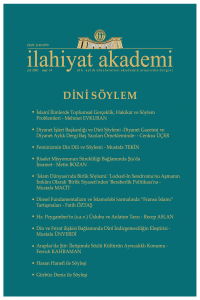el-Meskûtü ‘anh fi’t-türâsi’l-belâgî, Muhammed Muhammed Ebû Mûsâ (Kahire: Mektebetü Vehbe, 2017), 724 sayfa, ISBN: 9789772254590
Ebû Mûsâ’nın el-Meskûtü ‘anh fi’t-türâsi’l-belâgî isimli eseri, bilginin inşası sürecinde âlimlerin titiz yöntemlerine dikkat çekmesiyle ön plana çıkmaktadır. Müberred’in el-Kâmil’indeki belagat konularının ele alınışı, belagat tarihinde üzerinde durulması gereken başlıca problemler ve Cürcânî’nin metinlere yaklaşımı eserde işlenen ana konulardır. Yazar, konular aracılığıyla eser boyunca tüketici bir okumadan ziyade araştırmacının yetkinliğini pekiştiren üretici bir okumanın lüzumuna vurgu yapmaktadır. Eserin niteliğini arttıran bu özellik, klasik metinleri yorumlamada zorluklarla karşılaşan günümüz araştırmacılarına sonu gelmeyen çalışma alanları yaratmaktadır. Yazarın eserdeki öncelikli amacı da kadim ulemanın ilim üretmedeki titizliği dikkate alınarak söz konusu çalışma alanlarının aktif hâle getirilmesidir.
Anahtar Kelimeler:
Belagat Tarihi, Metin Tahlili, Müberred, Abdülkâhir el-Cürcânî, Muhammed Muhammed Ebû Mûsâ, el-Meskûtü 'anh
al-Maskūtu ‘anh fī al-turāth al-balāghī, Moḥammad Moḥammad Abū Mūsā (Cairo: Maktabat Wahba, 2017), 724 pages, ISBN: 9789772254590
Abū Mūsā’s work named al-Maskūtu ‘anh fī al-turāth al-balāghī, draws attention to the rigorous methods of scientists in the construction of knowledge. The handling of the issues related to rhetoric in al-Mubarrad's al-Kāmil, the main issues that need to be emphasized in the history of rhetoric, al-Jurjānī’s approach to texts are other important issues covered in the work. The author emphasizes the necessity of a productive reading that reinforces the competence of the researcher rather than a consuming reading throughout the work through the topics he deals with. This feature, which increases the quality of the work, creates important study areas for today's researchers who have difficulty in understanding classical texts. The main purpose of the author is to activate the mentioned study fields by taking the meticulousness of the classical period scientists as an example.
Keywords:
History of Rhetoric, Text Analysis, al-Mubarrad, 'Abd al-Qâhir al-Jurjânî, Mohammad Mohammed Ebu Musa, el-Meskûtü 'anh,
___
- Ebû Mûsâ, Muhammed Muhammed. el-Meskûtü ‘anh fi’t-türâsi’l-belâgî. Kahire: Mektebetü Vehbe, 2017.
- ISSN: 2149-3979
- Yayın Aralığı: Yılda 2 Sayı
- Başlangıç: 2015
- Yayıncı: Gaziantep Üniversitesi
Sayıdaki Diğer Makaleler
Mâlikî Mezhebinde Haber-i Vâhid ve Kıyâs Teâruzu
Murat NERGİS, Adnan MEMDUHOĞLU
Kur'an'ı Anlamaya Katkısı Bakımından: Kur'an'ın Nüzûl Ortamı ve Nüzûl Süreci
Modern Mısır’da Çağdaş Sünnet Anlayışının Siyaset, Hukuk ve Eğitime Etkileri
İslam Siyaset Hukukunda Tazir Kavramı ve Kanunlaştırma Kavramıyla Karşılaştırılması
Din ve Değerler Eğitimi Açısından 'Tay' Animasyon Sinema Filminin İncelemesi
Schellenberg'in 'Mükemmel Sevgi' Tanımı Tanrı İçin Uygun Bir Nitelik midir?
